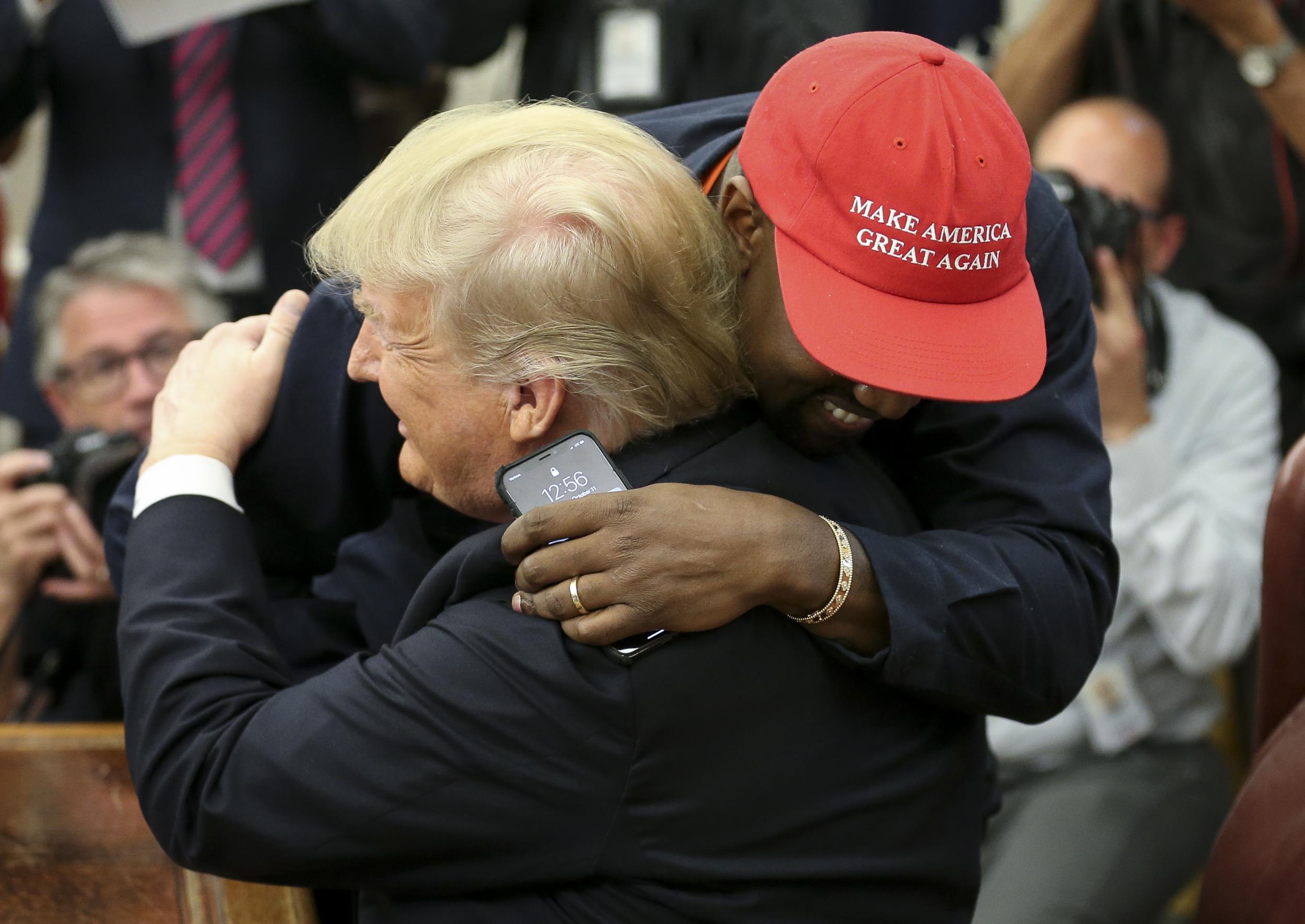Hell (of a) Life
Posted: by The Alt Editing Staff

There are dozens of lines in Kanye West’s catalog that are now ripe for picking and re-contextualizing amidst his latest transformation. “Wait til I get my money right / then you can’t tell me nothing, right?” from 2007’s Graduation is maybe the most obvious and prescient. The oafish and increasingly stubborn MAGA Kanye seems to have completely lost all 45 seconds of self-awareness he still had back in 2016—the year he first met with Trump. Now he’s at a point where no one besides right-wing ghouls can tell him anything he considers valid.
But the hook of “Hell Of A Life,” one of the more divisive cuts on his 2010 opus My Beautiful Dark Twisted Fantasy, is, to me, the most painfully easy to reinterpret on the day he visited Trump (again) and ranted (again) about abolishing the 13th amendment, among other outrageous things.
“Have you lost your mind / tell me when you think we’ve crossed the line / no more drugs for me / pussy and religion is all I need / grab my hand and / baby we’ll live a hell of a life,” goes the song’s slippery, auto-tuned chorus.
He’s lost his mind. He’s ran a mile past the line. He’s off his meds. He’s horny as shit. He’s a self-appointed pastor in the church of MAGA. And we’re most certainly living a hell (noun, not adjective) of a life.
Many of us forced ourselves to try and forget Kanye’s 2016 meeting at Trump Tower as if it was a vivid yet fleeting nightmare. But now that we’ve lived in the hellscape for two excruciating years since that incident, and desperately stuffing nightmarish scenarios behind a bulging closet door has become part of our daily routine, it feels depressingly normal to be failed by an institution that we once—naively—put our unwavering trust in.
The Democratic Party, the Supreme Court, the Senate, and the major news networks, to name a few, are all bodies that should ostensibly err to the side of justice according to the (broken) system that built them, and their insidious failings have become more visible and potent than ever since 2016. Kanye West, an immensely famous musician whose opinions were legitimized by way of his celebrity, was heralded throughout the last 15 years as someone who erred to the side of cultural justice.
He revamped the sound, aesthetic, and cultural ability of hip-hop multiple times over. He became a fashion icon in an industry that historically, and presently, rejects the work of people of color. He called out George W. Bush’s racism on live TV and wrote songs that approached inequality and injustice with righteous aggression. He was a brash public figure who said foolish and absurd things that were sometimes problematic, but ultimately considered entertaining and excusable because of his thoughtful, cutting-edge, and massively popular art.
As Pitchfork’s Jayson Greene wrote earlier this year, we should’ve never treated Kanye—or any other artist, celebrity, or public figure—as a genius. Putting that much faith into someone, especially someone who thinks they’re a god, is a setup for inevitable disappointment. This isn’t to say that Kanye, a rapper, and the Supreme Court, our country’s highest court of law, are or should be comparable bodies of power and influence. But at least for my generation (the Kanye generation) the last couple years have yielded a painful coming-of-age lesson in the futility of the supposed opposition to all that is immoral and chaotic (Democrats, courts, liberal news). They’ve also been a lesson in the nonexistence of the divine celebrity.
Last night I had a brief conversation with my brother and some friends about Kanye West. I said I haven’t heard “I Love It,” his surprisingly popular new single featuring Lil Pump, and that I have no interest in listening to it anytime soon. My brother, who’s been into Kanye as long as I have, said he loves the song and that despite Kanye’s shitty politics, he’s still able to separate his art from his behavior and judge it based on its musical merits alone. I disagreed but I didn’t fight him on it, as the ongoing conversation about art vs. artist can get exhausting, and those discussions usually come down to minor differences in how people consume art and/or quantify an artist’s influence.
The Kanye discussion is one I’ve had a dozen times this year alone, but last night I realized how much it feels like a political conversation. That is, a conversation where no one wins and both parties leave feeling varying degrees of rightfulness, but neither has the means to materialize that superiority into a single, persuasive object.
There’s already been a flood of essays about Kanye that all tangentially approach the unanswerable question of: what do we do with a toppling cultural figurehead? So I guess this piece is another droplet in the deluge. For me, though, these last two weeks of Kanye reiterating that slavery is a choice, reattaching the MAGA hat, revisiting Trump, and purporting that because “we don’t have 13 floors” on skyscrapers, we shouldn’t have a 13th amendment, has crystallized the discussion of Kanye West into a discussion of politics. That’s the line that’s now been crossed, and I don’t think it’s one that he’ll ever be able to step back over.
Last night I admitted that I’ll probably listen to Yandhi (if it ever comes out) because I feel its my civic duty as a music journalist and music fan to hear what the most influential artist of my generation has to offer. Much in the way that, as someone with an interest in national politics, I’ll probably hate-watch the State of the Union address.
Those two events—a new Kanye album and an inevitably shitty, delirious, enraging speech—feel the same to me now. And my god does it feel like a hell of a life.
—
Eli Enis | @eli_enis
The Alternative is ad-free and 100% supported by our readers. If you’d like to help us produce more content and promote more great new music, please consider donating to our Patreon page, which also allows you to receive sweet perks like free albums and The Alternative merch.










